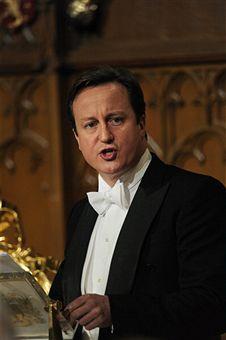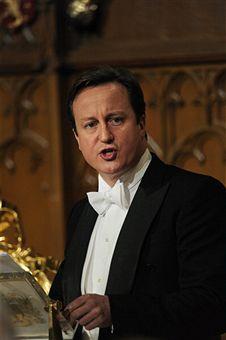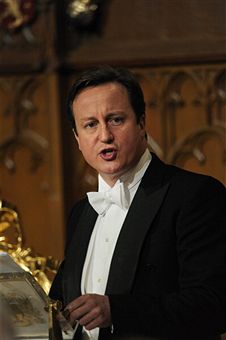The Euro-crisis is an opportunity for Britain to reshape its relationship with the EU, David Cameron said on Monday, describing it as “out of touch” and “immune from the developments of the real world”.
In his annual speech to the City, he said that powers leached away over time should “ebb” back from Brussels to London.
Cameron is under pressure from the Euro-sceptic wing of his party, which last week mounted an 81-strong rebellion on a parliamentary vote on an EU referendum.
But although he did describe himself as a “sceptic”, he insisted Britain should not split from the EU, for the sake of it’s own interest.
“Leaving the EU is not in our national interest,” he said. “Outside, we would end up like Norway, subject to every rule for the single market made in Brussels but unable to shape those rules.
“Believe me, if we weren’t in there helping write the rules they would be written without us - the biggest supporter of open markets and free trade - and we would not like the outcome.”
But he did not hold back criticism for the current state of the EU.
“Think how the European Union, as it is tonight, looks to those with growing economies watching from Sao Paulo, from Delhi or indeed Washington. Not – as it should be – a place to admire and emulate … but a source of alarm and crisis.
“It does not have to be like this. Out of crisis can come opportunity for the European Union, if its member states are ready to grasp it.”
But as the British prime minister underlined the need for greater flexibility and for the loosening of ties, the German Chancellor called for greater unity.
Angela Merkel told her party on Monday: “Europe is in one of its toughest, perhaps the toughest hour since World War II.
“The challenge of our generation is to complete economic and monetary union in Europe, and to create a political union step by step.”
“The euro is more than a currency. It is the symbol of European unity and integration,” she said.
“It has become the symbol of half a century of peace, freedom, and prosperity. All I can say is, if the euro fails, Europe will fail.”
Last month, 81 Tory MPs rebelled against the three-line whip on a motion regarding an EU referendum introduced by MP David Nuttall.
Nuttall outlined the rationale behind the motion, a sentiment echoed by many Euro-sceptic MPs.
“We are on a conveyor belt to a United States of Europe, which is absolutely not what the people voted for back in 1975,” he told The Epoch Times. “I am absolutely certain that if there was a referendum today, only a small proportion of the British people would vote to remain in the EU on the same terms that we presently are.”
Polls before the vote showed that 70 percent of the British wanted a referendum and 49 percent would vote to leave, while only 40 percent would vote to stay. David Nuttall’s motion proposed a three-way referendum in which a third option would be to renegotiate Britain’s terms.
In his Lord Mayor’s speech, which traditionally focuses on foreign policy, Cameron said he would not shy away from doing business with countries with poor human rights records.
“In dealing with other countries, their politics matter. But when the politics are troubling the answer isn’t to deal with the politics and put the trade on hold,” he said.
“We must be bold enough to try and deal with the politics and the trade at the same time. We should always be a champion of human rights - and we should address our differences candidly. But we should not allow them to define and limit the whole relationship.”







